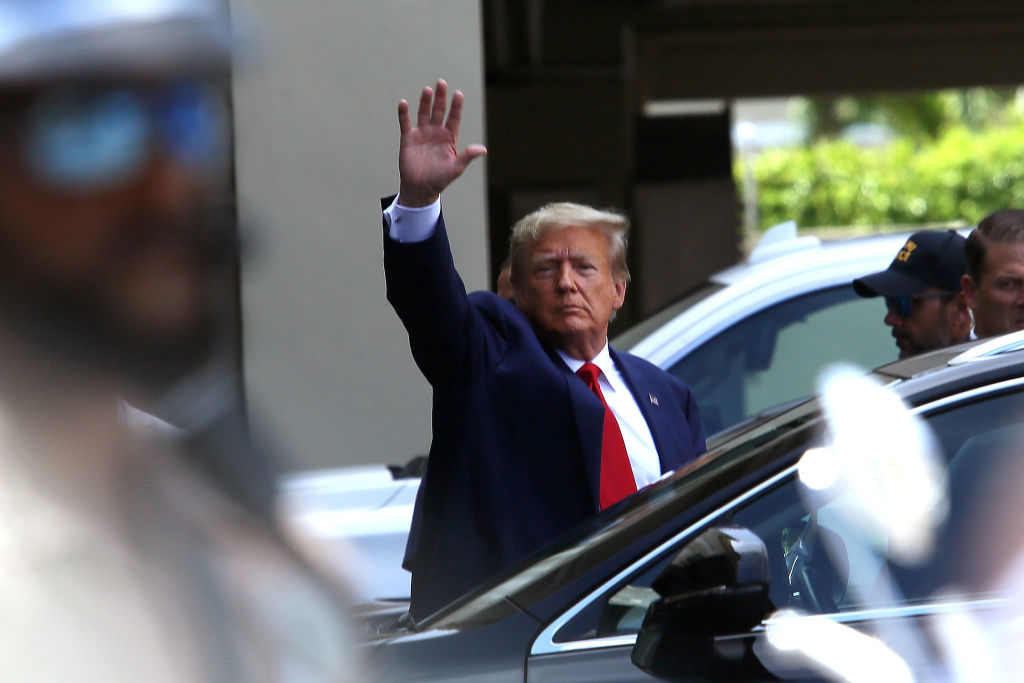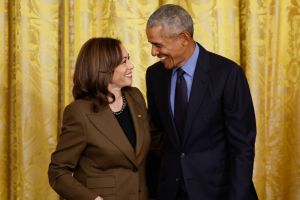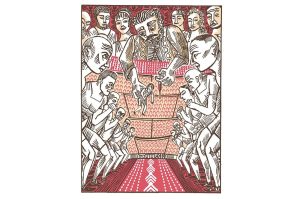The scene in Miami was somewhat less than promised today, with the predicted tens of thousands of protesters replaced instead by the handful of eccentrics who always seem to find ways to show up at things involving Donald Trump — even historically significant things like the first federal arraignment of a president of the United States on criminal charges. As expected, inside the courthouse Trump pled not guilty to all thirty-seven counts brought against him by the feds, and his mood was reportedly somber.
For Trump, it’s quite possible that this case will drag out well into the 2024 presidential race and potentially beyond. He has claimed that he will not pardon himself, though we’ll see if that lasts should he return to the White House. Other candidates, notably Vivek Ramaswamy, who appeared on hand in a “TRUTH”-emblazoned hat speaking through a megaphone, have signaled their loud opposition to the case. Only a handful of elected Republicans have thus far backed the idea that the charges are fully justified by the former president’s actions — most instead are sounding a note of defiance and channeling GOP voter anger at the FBI, the DoJ and the “Deep State” that has purportedly targeted Trump for years.
What remains is the question about why this case ever got this far to begin with — why Trump held on to so much material, including many clearly classified documents of national security import, well past the point where it became clear this put him in a legally precarious position. Negotiation over such documents is a very normal thing to happen after presidencies, with the complicated negotiation of archival interests and in the context of a general overclassification of records. But as C.J. Ciaramella points out, in Trump’s case, the most rational theory as to why he wouldn’t just let these boxes go is to think in simple terms — they’re his, so he’s keeping them:
All of the substantive reporting, as well as the recently filed indictment, has backed up the “my boxes” hypothesis. In August, the New York Times reported that Trump told several advisors, in response to the National Archives’ demands that he return the boxes: “It’s not theirs; it’s mine.” The Washington Post reported in November that “Trump repeatedly said the materials were his, not the government’s — often in profane terms…
According to the thirty-seven-count indictment filed in federal court against Trump this week, he told one of his long-suffering attorneys: “I don’t want anybody looking, I don’t want anybody looking through my boxes, I really don’t, I don’t want you looking through my boxes.”
Well. Whatever Trump wanted to hoard in those boxes, whether in the ballroom or the bathroom or wherever else he had them moved, and whatever the motivation for keeping them — because they proved a point, because he could use them to impress a guest, because he hoards as many a septuagenarian American tends to hoard — he is now in the thick of the most significant legal challenge of his political career. It is impossible to know if he thinks it was worth it, or if he just got bad legal advice about how much risk he actually faced.
His legal team has already signaled that they plan to try and slow down this case, with filings designed to run the clock in Florida’s notoriously quick “rocket docket.” The case will almost certainly end up before the Supreme Court, and the penalties involved could be severe enough to give the #Resistance class — who seemed to find in this development the jubilation they were denied by Robert Mueller and so many others before — quite a warm feeling.
Yet the scene in Florida seemed more pathetic than anything else. The media scrum turned its eyes toward one man in particular, bedecked in an American flag, who held a pig’s head on a spike in what he claimed was a reference to William Golding’s Lord of the Flies. It seems apt for the political moment, amid the squabbling adults who yell impotent epithets at CNN and speak in terms of banana republics: “The world, that understandable and lawful world, was slipping away.”





















